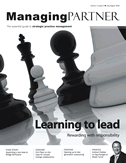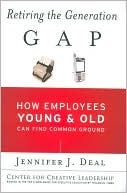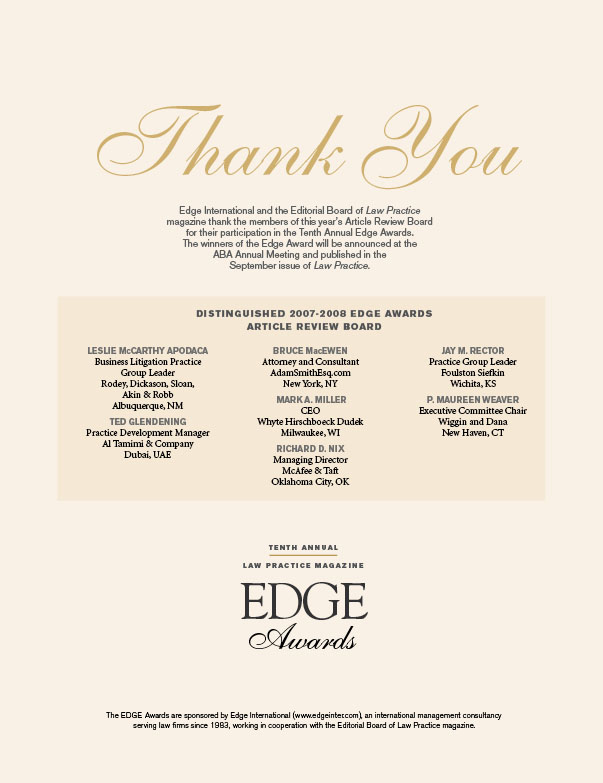
|
http://www.patrickmckenna.com/blog
Page << Prev 60 61 62 63 64 65 66 67 68 69 Next >> of 95
Post #331 – Tuesday, August 5, 2008
A Special Offer From Managing Partner Magazine
An e-mail today from my good friend Daniel Smallwood of Ark Publishing:
 Just to let you know we are currently running a special offer on MP Magazine whereby people can subscribe to the online version of MP for $195 (saving around $250). Anyone interested in subscribing can contact us quoting reference code “MPR-E1” Just to let you know we are currently running a special offer on MP Magazine whereby people can subscribe to the online version of MP for $195 (saving around $250). Anyone interested in subscribing can contact us quoting reference code “MPR-E1”
You should also know that subscribing to Managing Partner magazine offers some exclusive benefits including:
- Password protected access to the Managing Partner magazine website which, among other things, provides the entire back catalogue in a fully searchable format;
- A monthly email news service;
- Regular special focus supplements;
- Discounts on all Ark Group reports* and
- Discounts on all Ark Group conferences, exhibitions and masterclasses.
*And of course, the Ark Group Reports include my latest Monograph: Passing The Baton: The Last 100 Days.
You can access more information on all of Arks subscriptions and publications - here.
Post #330 - Monday, August 4, 2008
Generational Leadership
With all of the talk about how you have to manage Generation X differently, Jennifer Deal has written an important book for leaders who want to understand generational leadership. Drawn from a database of 3,200 people surveyed from 2000 to 2005, her book, Retiring the Generation Gap: How Employees Young & Old Can Find Common Ground challenges many of the assumptive differences between generations that she identifies - Silents (born 1925-1945); Early Boomers (born 1946-1954); Late Boomers (born 1955-1963); Early Xers (1964-1976) and Late Xers (1977-1986).
 Here's an overview of the top findings. I would suggest reading this book for the detail behind these results: Here's an overview of the top findings. I would suggest reading this book for the detail behind these results:
All generations have similar values.
- Top values for every generation are Family, Integrity, and Love.
Everyone wants respect, they just define it differently.
- Older generations want respect for their experience and younger generations want respect for their new ideas and suggestions.
Trust matters a lot.
- The less people trust their leaders and or organizations, the more likely they are to leave.
People want leaders who they can believe in.
- All generations want leaders who are credible, trustworthy, dependable, farsighted, encouraging and good listeners.
People don’t like organizational politics.
- People higher in the organization think that politics is less important than people lower in that same organization.
No one likes change.
- Young or old don’t like change largely because they fear more loss than gain by the change.
Loyalty depends on context not age.
- All groups have about the same level of loyalty. Younger people tend to job hop more than older generations did.
Retaining younger and older people is easy if you do the right things.
- Retention keys: Good compensation, learning and development; opportunities for advancement, respect and recognition; and quality of life outside of work.
Everyone wants to learn—more than anything else—97% or respondent said this!
- Top 10 things they want to learn: Leadership, skills in their field, team building, problem solving, strategic planning, change management, computer skills, vision, communications, and conflict management.
Post #329 - Thursday, July 31, 2008
A Leadership Lesson Worth Remembering
A client recently sent me the following old favorite. Although she had heard it many years ago, she enjoyed and appreciated hearing it again. After reviewing it myself, I certainly have to agree with her. I also thought of many people I’ve met who hold a variety of leadership roles who obviously missed this “oldie but goodie” the first time around. It’s one of many we should all remember and pass on to emerging leaders in every organization.
During my second year at business school, our professor gave us a pop quiz. I was a conscientious student and had breezed through the questions, until I read the last one:
“What is the first name of the woman who cleans the school?”
Surely this was some kind of joke. I had seen the cleaning woman several times. She was tall, red-haired and in her early 40s, but how would I know her name?
I handed in my paper, leaving the last question blank. Just before class ended, one student asked if the last question would count toward our quiz grade.
“Absolutely,” said the professor. “In your careers, you will meet many people. All are significant. They deserve your attention and care, even if all you do is smile and say ‘hello’.”
I’ve never forgotten that lesson. I’ve also never forgotten her name was Dorothy.
NOW, grab a pen and see if you can answer these questions. You might be surprised.
From achievements realized during the last decade . . .
Name three of the wealthiest people in 'the world'.
Name three people who have won the Nobel or Pulitzer prize.
Name three Academy Award winners for best actor and actress.
Name three gold medal Olympic champions.
How did you do?
The point here is that many of us fail to remember the headliners of yesterday … and these are no second-rate achievers. They are the best in their fields. But the applause dies. Awards tarnish. Achievements are forgotten. Accolades and certificates are buried with their owners.
SO, here’s another quiz. See how you do on this one:
List three teachers who aided your journey through school.
Name three friends who have helped you through a difficult time.
Name three people who have taught you something worthwhile.
Name three people who have made you feel appreciated and special.
Name three people you enjoy spending time with.
Easier? The lesson: The people who make a difference in your life are not the ones with the most credentials, the most money, or the most awards. They are the ones that care. If at all possible, take a moment from your busy schedule and offer them your thanks and appreciation—while you still can.
Then proceed to attempt to get yourself on someone else’s list … mentor, teach, share. You’ll feel as good about your effort as they will.

Post #328 - Sunday, July 27, 2008
Working With Client Teams
Over the past couple of years I’ve had the opportunity of working hands-on with over 30 Client Teams (as diverse as: Lehman Brothers, Marathon Petroleum, Toshiba, Medtronic, Nissan, ING, and PriceWaterhouseCoopers) at significant law firms in both North America and Europe.
The overall philosophy of my approach is based on enhancing the level of service provided the client; not on selling. The process involves a number of, what I believe to be, innovative touches, from the way we train lawyers to interview their client representatives, to the questions we use, to what we do with what we've learned, to how we have the team explore client lock-in strategies. I’ve enjoyed some significant success with the approach including a number of instances where the client went from a legal spend of a couple of hundred thousand to well over $1million within the space of the first year.
 That said, it is often the little touches that these teams implement that can make a huge measurable impact. Here’s an excerpt from an e-mail that was shared with me earlier this week: That said, it is often the little touches that these teams implement that can make a huge measurable impact. Here’s an excerpt from an e-mail that was shared with me earlier this week:
I wanted to share with you all an event that the Client Service Team did this week. Knowing that the legal department was moving to its new headquarters, they sent lunch to the team on their first day in their new building. Now this sounds simple, but I have read over 25"thank you" e-mails from the recipients of the lunches, from top (the GC) to bottom (paralegals), the gesture was met with resounding success. The gesture was small and cost effective, but the results and impression it made was tremendous. Please share this as an example of just another way to reach out to our clients. It is often the simple things that make the best impressions . . . big events are great, but knowing your clients and their needs (even lunch on the first day in a new building) can never be overlooked.
Post #327 - Friday, July 11, 2008
Having A Sounding Board
Do you have a confidant in whom you can discuss your burning issues - your own personal leadership sounding board?
 With the pace of business today the pressure has never been higher, or the temptation greater to act just for the sake of moving things off your pending pile and appearing decisive. This kind of 'shoot from the hip' style may make us feel confident that we are getting somewhere. However, you are usually dealing with complex, multi-faceted issues that require more consideration. This is where I often find leaders can gain significant value from working with an external 'sounding board' someone they respect, who they can confide in and who can challenge their thinking process. With the pace of business today the pressure has never been higher, or the temptation greater to act just for the sake of moving things off your pending pile and appearing decisive. This kind of 'shoot from the hip' style may make us feel confident that we are getting somewhere. However, you are usually dealing with complex, multi-faceted issues that require more consideration. This is where I often find leaders can gain significant value from working with an external 'sounding board' someone they respect, who they can confide in and who can challenge their thinking process.
Booking time with someone outside of your firm, with no axe to grind, and that you can talk freely to, about your agenda, in complete confidence, has a number of benefits:
1. It makes space for you to think things through.
It is always helpful to pause to consider whether you are planning not only to do things right, but more importantly, to do the right things! It is all too easy to get sucked into operational details and it is your job to ensure that the issues that are strategic have been properly identified and planned for. If you are not strategic in the use of your time, chances are you are not being sufficiently strategic in other areas!
2. The very act of explaining your ideas and issues to someone objective can help you clarify your own thinking.
There is a natural 'sorting' process that goes on whenever you gather together all of bits that are similar and create a clearer, more complete picture. This process helps sequence your thinking in a way that makes your overall story much more coherent and easily conveyed.
3. It gives you the chance to develop your ideas further, and if necessary, change direction completely with no loss of face, and no adverse consequences.
It is very normal for a good leader to have doubts, and it is a part of the job to explore them as honestly as possible. This is a naturally uncomfortable process and it helps to have someone support you through it.
4. It allows you to have your thinking challenged in a non-threatening environment.
In days of old, Kings had Court Jesters who had license to say exactly what they thought, as truthfulness tends to shrivel as it gets closer to power. An outsider can ask those apparently daft, but highly challenging questions such as "Why would you want to do that?" "What would happen if you didn't do that?" etc.
5. An outsider can often see when the leader is part of the problem and highlight when you might need to consider your own contribution to the situation.
An activity that can be valuably performed in this safe space is venting. Once words are spoken they cannot be unspoken and in every team there are frustrations, doubts and fears. These can all get in the way of the smooth running of your firm. Deciding which issues are ones you need to take up with someone directly and which ones are just the result of, perhaps you having a bad day, can make you a much better person to work with.
6. It allows you to seek input from someone outside your firm's political structure and therefore not need to play power games.
This process is not about someone coming in and telling you how to run your firm, something that you are uniquely qualified to do; but rather it is to help you "get at the wisdom you already have." When this is supplemented with a little outside input it becomes a very potent dish.
7. You are able to bring in new ideas from outside your firm.
One managing partner I worked with said to me that he could only discuss a particular issue with two other people in his firm, and he already knew what they would both say, so he definitely needed a fresh perspective. This is by no means untypical.
Time spent in reflection and exploration with a trusted confidant is a good way of reducing your stress. Decisions that have been thought through inspire more confidence, and this raises your 'stock' with your people and their willingness to follow your lead. In the end if you are like the firm leaders and practice leaders I work with, you will typically leave these discussions much more focused about what is really important to you; clear about what you need to do next; and understand where you can either afford to take action or need to delegate.
For 25 years, I have been priviledged to work with the top management of leading law firms to challenge and escalate their thinking on how to effectively manage and compete. Give me a call today to discuss (no-obligation) how I could serve as your sounding board.
Post #326 - Wednesday, July 9, 2008
Edge Award Winners
 Beginning back in 1998, together with the editorial group of the American Bar Association’s section publication: Law Practice Magazine, I have coordinated the awarding of three awards provided to the authors of the best articles during the year. Beginning back in 1998, together with the editorial group of the American Bar Association’s section publication: Law Practice Magazine, I have coordinated the awarding of three awards provided to the authors of the best articles during the year.
To review, vote and determine these awards I have each year, brought together a group of seven managing partners, practice leaders and practitioners to form an "Articles Review Board." This Board reviews the articles in each of eight issues to determine the best two feature articles and the best column. The Board members judge these articles based on their contribution to either advancing the knowledge base of managing a professional services firm and / or to advancing an individual attorneys practical methods for effectively conducting their practice.
This year, the tribe has spoken and this past week determined our award winners for 2007 – 2008:
Best Feature Article:
Rethinking Retirement: Understanding The War For Legal Talent In The Changing Marketplace
Stephen P. Gallagher
(December 2007)
Silver Feature Article:
Building The Bridge To Inclusion: The Work of Law Firm Leaders
Martha Fay Africa
(June 2008)
Bronze Feature Article:
Law Practice Business: The Importance of Emotional Intelligence in Law Firm Partners
Ronda Muir
(July – August 2007)
A special thank you to the members of this year’s Article Review Board: 
AND, I received a nice acknowledgement note from Steve Gallagher: "Patrick, I have been around long enough to appreciate what the Edge Award stands for. Your organization has been setting standards for leadership in the legal profession for years. I, for one, have read everything your team puts on paper or on the Internet. I hope other practitioners are able to use this article, "Rethinking Retirement " to convince others to take bold new steps in helping senior attorneys stay connected on terms of their own choosing."

Stephen P. Gallagher - LeadershipCoach.us
Post #325 - Wednesday, July 2, 2008
Still Deciding To Downsize
The beauty of law firms has traditionally been their counter-cyclical nature.
 Despite this theory and concurrent with my earlier Post# 322, the legal market has already seen redundancies. Sonnenschein's candid managing partner Elliott Portnoy confirms the prevailing mood of uncertainty about the nature of this downturn and the failure of disputes to take up the strain. He labels the current sentiment "anxious". The natural inclination of lawyers, argues Portnoy, is to liken the current downturn to earlier ones and by doing so hope to discover clear markers as to when and how it will end. "But this downturn is very unlike others," he maintains. "Others have been by sector, such as technology. When that happened, at least other sectors in the economy were doing okay. This is across nearly every sector." Despite this theory and concurrent with my earlier Post# 322, the legal market has already seen redundancies. Sonnenschein's candid managing partner Elliott Portnoy confirms the prevailing mood of uncertainty about the nature of this downturn and the failure of disputes to take up the strain. He labels the current sentiment "anxious". The natural inclination of lawyers, argues Portnoy, is to liken the current downturn to earlier ones and by doing so hope to discover clear markers as to when and how it will end. "But this downturn is very unlike others," he maintains. "Others have been by sector, such as technology. When that happened, at least other sectors in the economy were doing okay. This is across nearly every sector."
Paul Tvetenstrand, the equally forthcoming managing partner of Thacher Proffitt concurs: "Frankly, there's no way on God's green earth that firms haven't had to do something. You can plan for a slowdown, but you can't plan for everyone slamming on the brakes."
Adding to the wreaths of smoke making the true position in the legal market difficult to distinguish is the fact that firms such as Sonnenschein are also using the current turbulence as an opportunity to boost lawyer numbers. "We made 42 lateral partner and counsel hires in 2007 and we're on course for a record number of hires this year," says Portnoy.
That said, there is a bunker mentality building among law firms at the moment. According to statistics released by the Department of Labor, the legal market lost 1,100 jobs in May. It was the third consecutive monthly drop in US legal market circles. The consensus from those who will engage with the subject, is that the worst is yet to come and now we wait to see what June's numbers will indicate.

Post #324 - Thursday, June 26, 2008
Handling Boomers Approaching Retirement
Our LAB has been very busy of late. Here is the latest question posed to our Managing Partner Leadership Advisory Board (The LAB):
Here's a question we're facing, as we have a significant number of baby boomers approaching retirement. Our firm has always approached transition / retirement on a fairly ad hoc basis, and we'd like to adopt some guidelines which would offer a bit more certainty on both sides.
 Over the past 20 years, most of our attorneys (between the ages of, say, 57-63) begin to slow down somewhat, their total compensation begins to slide downward with their production / hours, and eventually they decide to go Of Counsel (which is close to semi-retirement here). Our Of Counsel arrangements generally include two years of regular firm benefits (including firm contribution for health, dental, life insurance). The initial compensation portion of the Of Counsel arrangement has varied considerably, depending upon the senior attorney's timing and ongoing value to the firm, e.g., does the attorney have many loyal clients whom we hope to transition to others? Will the attorney cease all billable work or merely reduce time over a 2-4 year period? Thus, some attorneys receive a predetermined salary (generally a portion of the prior base salary, but usually with no expectation of a bonus), others receive pay based on a formula, and others receive nothing (but with a possibility of a discretionary bonus if they in fact produce some revenues--either by billable work or client billings). Over the past 20 years, most of our attorneys (between the ages of, say, 57-63) begin to slow down somewhat, their total compensation begins to slide downward with their production / hours, and eventually they decide to go Of Counsel (which is close to semi-retirement here). Our Of Counsel arrangements generally include two years of regular firm benefits (including firm contribution for health, dental, life insurance). The initial compensation portion of the Of Counsel arrangement has varied considerably, depending upon the senior attorney's timing and ongoing value to the firm, e.g., does the attorney have many loyal clients whom we hope to transition to others? Will the attorney cease all billable work or merely reduce time over a 2-4 year period? Thus, some attorneys receive a predetermined salary (generally a portion of the prior base salary, but usually with no expectation of a bonus), others receive pay based on a formula, and others receive nothing (but with a possibility of a discretionary bonus if they in fact produce some revenues--either by billable work or client billings).
The Firm obviously would like to capture the senior attorney's good will and client base, if possible, and to assist the senior attorney into retirement. Do you have any suggestions for ways in which law firms can promote the various interests / goals in a fair manner?
Read the entire question and response: Handling Boomers Approaching Retirment [PDF Version]
The LAB was formed as a resource to provide pragmatic advice to assist new managing partners with their critical burning issues and help them succeed. The LAB is comprised of the following distinguished current and former law firm leaders: Angelo Arcadipane (Dickstein Shapiro LLP); John Bouma (Snell & Wilmer LLP); Brian K. Burke (Baker & Daniels LLP); Ben F. Johnson, III (Alston & Bird LLP); John R. Sapp (Michael Best & Friedrich LLP); Keith B. Simmons (Bass Berry & Sims PLC); William J. Strickland (McGuire Woods LLP); Harry P. Trueheart, III (Nixon Peabody LLP); together with Patrick J. McKenna (Edge International).
Post #323 - Thursday, June 26, 2008
Leading With "No," "But," or "However"
A leadership lesson as told by Marshall Goldsmith . . .
A few years ago the CEO of a manufacturing company hired me to coach his COO, a talented man, also stubborn and opinionated. The first time I met with him to go through his direct reports' feedback, his reaction was, "But Marshall, I don't do that."
 "That one is free," I said. "Next time I hear 'no,' 'but,' or 'however,' it'll cost you $20." "That one is free," I said. "Next time I hear 'no,' 'but,' or 'however,' it'll cost you $20."
"But," he replied, "that's not..."
"That's $20!"
"No, I don't..." he refuted.
"That's $40!"
Within an hour, he was out $420. It took another two hours before he finally understood and said, "Thank you."
When you start a sentence with "no," "but," "however," or any variation thereof, no matter how friendly your tone or how many cute mollifying phrases you throw in to acknowledge the other person's feelings, the message to the other person is: You are wrong. It's not, "I have a different opinion." It's not, "I
disagree with you." It's bluntly and unequivocally, "What you're saying is wrong, and what I'm saying is right." Nothing productive can happen after that. The general response from the other person is to dispute your position and push back. From there, the conversation dissolves into a pointless war. You're no longer communicating; you're both trying to win.
For one week – stop trying to defend your position and start monitoring how many times you begin remarks with "no," "but," or "however." Pay extra-close attention to those moments when you use these words in sentences whose ostensible purpose is agreement with the other party. For example, "That's true, however..." (Meaning: you don't think it's true at all.) Or the common opener, "Yes, but..." (Meaning: prepare to be contradicted.) Once you appreciate how guilty you have been, maybe then you'll begin to change your ways.
Marshall Goldsmith is a world authority in helping successful leaders achieve positive, measurable change in behavior: for themselves, their people and their teams.

Post #322 - Wednesday, June 18, 2008
Deciding To Downsize
Here is the latest question posed to our Managing Partner Leadership Advisory Board (The LAB):
 Over the past three months we have responded to this economic downturn by taking action on our collections, ratcheting-up our marketing efforts, and shifting various of our under-employed attorneys to different practice areas. Nevertheless by the end of May, with billings down dramatically and our juniors costing us $160,000 in salaries alone, we have decided that we cannot passively ride out these difficulties and need to make some hard decisions. Therefore, later in June, we will be quietly de-equitizing some of our underproductive partners and reluctantly announcing layoffs, of both associates and staff. We are a firm that has never had to take this kind of painful action in the past, and I fully expect it to take its toll on firm morale and productivity. How can I help people adjust to these new realities and get things back on track? Over the past three months we have responded to this economic downturn by taking action on our collections, ratcheting-up our marketing efforts, and shifting various of our under-employed attorneys to different practice areas. Nevertheless by the end of May, with billings down dramatically and our juniors costing us $160,000 in salaries alone, we have decided that we cannot passively ride out these difficulties and need to make some hard decisions. Therefore, later in June, we will be quietly de-equitizing some of our underproductive partners and reluctantly announcing layoffs, of both associates and staff. We are a firm that has never had to take this kind of painful action in the past, and I fully expect it to take its toll on firm morale and productivity. How can I help people adjust to these new realities and get things back on track?
Read the entire question and response: Deciding To Downsize [PDF Version]
The LAB was formed as a resource to provide pragmatic advice to assist new managing partners with their critical burning issues and help them succeed. The LAB is comprised of the following distinguished current and former law firm leaders: Angelo Arcadipane (Dickstein Shapiro LLP); John Bouma (Snell & Wilmer LLP); Brian K. Burke (Baker & Daniels LLP); Ben F. Johnson, III (Alston & Bird LLP); John R. Sapp (Michael Best & Friedrich LLP); Keith B. Simmons (Bass Berry & Sims PLC); William J. Strickland (McGuire Woods LLP); Harry P. Trueheart, III (Nixon Peabody LLP); together with Patrick J. McKenna (Edge International).
Page << Prev 60 61 62 63 64 65 66 67 68 69 Next >> of 95
|
|


 Ashridge House
Ashridge House  11226 - 60 Street
11226 - 60 Street  Edmonton, Canada
Edmonton, Canada  T5W 3Y8
T5W 3Y8